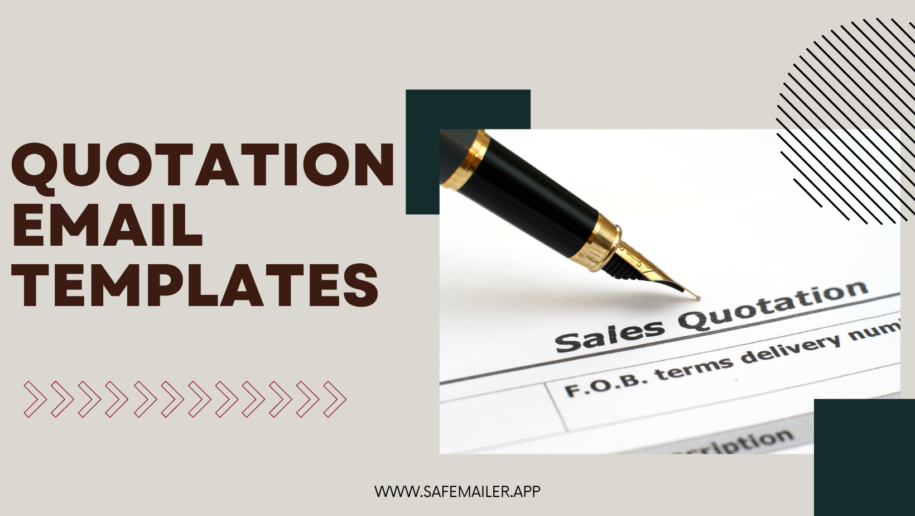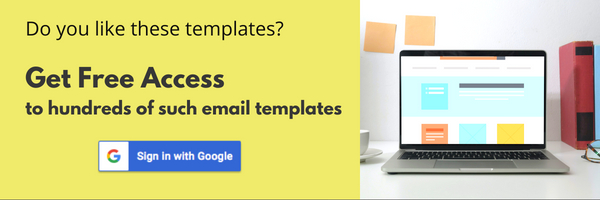Quotation emails are an essential part of the purchasing process for businesses.
They enable buyers to request price estimates from vendors and negotiate the terms of a sale. They also assist vendors in providing pricing information and clarifying transaction terms.
In this blog post, we’ll look at what is a quotation email, their different types, and every template possible for quotation emails. Understanding the role of quotation emails is critical to ensuring a smooth and successful transaction.
You can be a business owner looking to purchase goods and services or a vendor looking to provide quotations to potential buyers, you need quotation emails.
Table of contents
1. What is a quotation email?
2. Why to send a quotation email?
3. Best practices to send quotation emails
4. Each and every kind of a quotation email template
4.1 Request for quotation email template
4.2 Quotation offer email template
4.3 Revised quotation email template condition 1)
4.4 Revised quotation email template condition 2)
4.5 Acceptance of quotation email template
4.6 Rejection of quotation email template
5. Conclusion
What is a quotation email?
A quotation email is one that requests or provides pricing information for a product or service. Before making a purchase, quotation emails are commonly used in business to determine the cost of goods or services.
To request a quotation, a customer or buyer will typically send an email to a vendor or supplier outlining their requirements and asking for a price estimate.
The vendor will then reply with a quotation email that includes the cost of the requested goods or services, as well as any additional details such as delivery times and payment terms.
Quotation emails are an important part of the purchasing process because they assist buyers and sellers in negotiating and agreeing on sale terms. They also assist buyers in comparing prices and making informed decisions about which vendor to buy from.
Why to send a quotation email?
A person may send quotation emails for a variety of reasons, including:
To request pricing information:
Quotation emails are often used to request a price estimate for a product or service. This enables the buyer to compare prices and make informed purchases.
To negotiate terms:
Quotation emails can be used to negotiate the price, delivery time, and payment terms of a sale. This helps buyers and sellers come to an agreement that works for both parties.
To complete a purchase:
A quotation email can be used to formalise the purchase and confirm the details of the transaction once the terms of the sale have been agreed upon.
To track and manage purchases:
Quotation emails can be used to keep track of the products or services requested, as well as the associated prices. Budgeting and inventory management can benefit from this.
Overall, quotation emails are an important part of the purchasing process because they can help buyers and sellers effectively communicate and negotiate.

Best practices to send quotation emails
Here are some best practices to follow when sending quotation emails:
- Use a clear and concise subject line: Make it easy for the recipient to understand what the email is about.
- Use a professional greeting: Start the email with a formal greeting, such as “Dear [Name]” or “Hello [Name].”
- Introduce yourself: If you’re not familiar to the recipient, introduce yourself and your company.
- Provide a brief overview of the project: Explain what the project is and why you are offering a quote.
- Include details of the quote: Clearly outline the scope of work, the cost, and any terms and conditions.
- Use bullet points: Break down the quote into easy-to-read bullet points to make it easier for the recipient to understand.
- Provide a timeline: Let the recipient know when the work will be completed and when payment is due.
- Include contact information: Make it easy for the recipient to reach out to you with any questions or concerns.
- Use a professional closing: End the email with a formal closing, such as “Sincerely” or “Best regards,” and include your name and contact information.
- Proofread: Double-check the email for spelling and grammar errors with an AI grammar checker before sending it.
Each and every kind of a quotation email template:
There are several types of quotation emails that businesses might use, depending on their needs and the context of the request. Some examples of quotation emails are:
Request for Quotation (RFQ):
This type of quotation email is sent by a buyer to a vendor, requesting a price estimate for a specific product or service. The RFQ typically includes details about the quantity and specifications of the items being requested.
Request for quotation email template
Here is a template you can use when sending a request for quotation email:
 |
| Subject: Request for quotation for #Project Name# |
| Hi #First Name#, I hope this email finds you well. My name is #Your Name# and I am the #Your Job Title# at #Your Company#. We are currently in the process of #Project Description# and are looking for a reliable and competitively priced supplier for #Product/Service#. Could you please provide us with a quotation for #Product/Service#? We would be grateful if you could include the following information in your quotation: 1. Description of the product/service 2. Quantity needed 3. Delivery date 4. Payment terms 5. Any additional information that you think might be relevant We look forward to receiving your quotation and working with you in the future. Warm regards, #Signature# |
 |
Quotation offer:
A vendor will send this type of quotation email in response to a request for quotation. It includes the price and any additional information for the requested items, as well as any sale terms and conditions.
Quotation offer email template
Here is a template you can use when sending a quotation offer email:
 |
| Subject: Quotation offer for #Project Name# |
| Hi #First Name#, I hope this email finds you well. My name is #Your Name# and I am the #Your Job Title# at #Your Company#. We were delighted to receive your request for a quotation for #Project Name#. After careful review, we are pleased to offer the following quote: #Brief overview of the project# Scope of work: #List of tasks# Cost: #List of costs# Terms and conditions: #List of terms and conditions# We believe that this quote represents excellent value for money and we are confident that we can deliver the project to the highest standard. We are able to complete the work by #Date#. Payment is due #Date#. Please do not hesitate to contact us if you have any questions or concerns. Thank you for considering our quotation. Warm regards, #Signature# |
 |
Revised quotation:
This type of quotation email is used to modify or update an existing quotation. It may be used in 2 conditions.
1) If the buyer requests additional items or changes the quantity of items purchased, or.
2) If the vendor needs to adjust the price due to changes in material or labour costs.
Revised quotation email template condition 1)
Here is a template you can use when sending a revised quotation email as a buyer:
 |
| Subject: Revised quotation request for #Project Name# |
| Hi #First Name#, Thank you for your recent quotation for #Project Name#. We have reviewed the quotation and would like to request a revised quote for the following changes: #List of revised items or changes to quantities# Could you please provide us with a revised quotation that includes these changes? We would be grateful if you could include the following information in your revised quotation: 1. Description of the revised product/service 2. Revised quantity needed 3. Delivery date 4. Payment terms 5. Any additional information that you think might be relevant We look forward to receiving your revised quotation and working with you in the future. Warm regards, #Signature# |
 |
Revised quotation email template condition 2)
Here is a template you can use when sending a revised quotation email as a seller:
 |
| Subject: Quotation offer for #Project Name# |
| Hi #First Name#, I hope this email finds you well. My name is #Your Name# and I am the #Your Job Title# at #Your Company#. We were delighted to receive your request for a quotation for #Project Name#. After careful review, we are pleased to offer the following quote: #Brief overview of the project# Scope of work: #List of tasks# Cost: #List of costs# Terms and conditions: #List of terms and conditions# We believe that this quote represents excellent value for money and we are confident that we can deliver the project to the highest standard. We are able to complete the work by #Date#. Payment is due #Date#. Please do not hesitate to contact us if you have any questions or concerns. Thank you for considering our revised quotation. Warm regards, #Signature# |
 |
Acceptance of quotation:
A buyer sends this email to a vendor to accept the terms of a quotation and proceed with the purchase.
Acceptance of quotation email template
Here is a template you can use when sending an acceptance of quotation email:
 |
| Subject: Acceptance of quotation for #Project Name# |
| Hi #First Name#, We are pleased to accept your quotation for #Project Name#. Thank you for your prompt response and detailed proposal. Please find attached a copy of the signed quotation for your records. We look forward to working with you on this project and to a successful partnership. Warm regards, #Signature# |
 |
Rejection of quotation:
A buyer sends this type of quotation email to a vendor to decline a quotation. The buyer can use it if they decide to purchase from a different vendor or if the quotation’s terms are unacceptable.
Rejection of quotation email template
Here is a template you can use when sending a rejection of quotation email:
 |
| Subject: Rejection of quotation for #Project Name# |
| Hi #First Name#, Thank you for your quotation for #Project Name#. After carefully reviewing your proposal, we regret to inform you that we will not be able to accept it at this time. We appreciate the effort you have put into preparing the quotation and the time you have taken to understand our needs. We will keep your company in mind for future projects. Thank you for considering us and we wish you the best of luck with your future endeavors. Warm regards, #Signature# |
 |
Conclusion
Quotation emails are used in business to request or provide information about the price of a product or service.
They can be used to request a price estimate, negotiate the terms of a sale, formalize a purchase, or track and manage purchases.
Quotation emails are an important part of the purchasing process, helping buyers and sellers communicate and come to an agreement about the terms of a sale.
We at SafeMailer can help you choose from the different email templates that you need for your email campaigns.
Safemailer is a free email automat software that sends your marketing emails in waves. Instead of sending 1000 emails at once it sends them over several days, 1-2 minutes apart much like a real human would. Thus it bypasses spam filters.



Leave a Reply